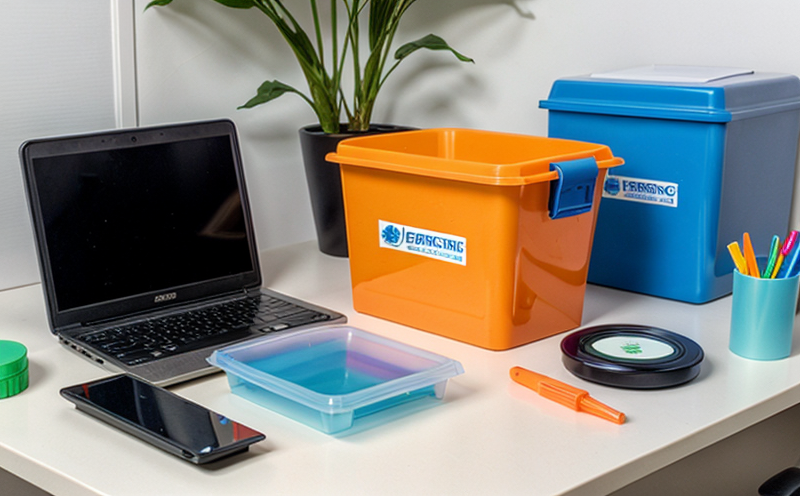JIS K 7216 Heat Deflection Temperature Testing of Office Plastic Materials
The JIS K 7216 heat deflection temperature test is a critical procedure used to evaluate the thermal properties of plastic materials. This test determines the maximum temperature at which a specified specimen can be bent into a defined angle without permanent deformation. In the context of office and stationery plastics, this test ensures that the materials used in products like pens, rulers, and other office supplies remain functional under various environmental conditions.
Thermal stability is crucial for ensuring product durability and reliability. The JIS K 7216 test helps manufacturers identify potential weaknesses in their plastic formulations early on, allowing them to make necessary adjustments before mass production begins. This ensures that the final products meet both performance expectations and regulatory requirements.
The test involves subjecting a small rectangular specimen cut from the plastic material to a specified temperature and load until it deflects by 0.25 mm under the applied force. The temperature at which this occurs is recorded as the heat deflection temperature (HDT). This value provides valuable insights into how well the material will perform in real-world conditions, such as office environments where temperatures can vary.
Understanding HDT is essential for several reasons:
- Product Durability: Higher HDT values indicate better resistance to heat-induced deformation, which translates to longer-lasting products.
- User Safety: Ensuring that office plastics do not soften or warp under normal usage conditions enhances user safety and satisfaction.
- Environmental Compliance: Meeting industry standards like JIS K 7216 helps businesses comply with international regulations governing the use of plastic materials in various sectors, including office supplies.
The test procedure outlined in JIS K 7216 is standardized and widely accepted, making it a reliable benchmark for assessing heat deflection temperatures across different types of plastics. By adhering to this standard, manufacturers can ensure consistency and quality in their products, thereby gaining competitive advantage and customer trust.
It's worth noting that while JIS K 7216 is primarily designed for office plastic materials, its principles apply broadly to any thermoplastics that need to maintain structural integrity under heat. This makes it a versatile tool for various industries beyond just stationery products.
Why It Matters
The importance of JIS K 7216 lies in its role as a key indicator of plastic material performance, particularly when exposed to heat. For office and stationery plastics, maintaining structural integrity is paramount for product reliability and user satisfaction. Here are some reasons why understanding the HDT value through this test is crucial:
Product Performance: Higher HDT values ensure that products remain functional in varied temperatures, extending their useful life.
- Pens and pencils should maintain their shape during use without melting or deforming.
- Rulers must retain accuracy regardless of environmental conditions.
- Other office supplies like binders need to withstand temperature changes without losing functionality.
User Safety & Satisfaction: Ensuring that plastic components do not soften, warp, or degrade under expected use enhances both safety and user experience. Users expect their office equipment to perform consistently over time.
- Employees can rely on pens and pencils without fear of them becoming unusable due to heat.
- Paper clips and other small office accessories should not bend or break under normal use.
Environmental Compliance & Brand Reputation: Adhering to international standards like JIS K 7216 demonstrates a commitment to quality and regulatory compliance, which can bolster brand reputation and customer loyalty.
- Manufacturers can avoid recalls or negative press by ensuring their products meet stringent testing criteria.
- A positive reputation for product reliability can lead to increased market share and customer trust.
In summary, the JIS K 7216 heat deflection temperature test is not just a technical requirement; it's an essential tool for ensuring that office plastic materials meet performance expectations, enhance user safety and satisfaction, and comply with industry standards. This holistic approach ensures that products perform reliably under various conditions, contributing to overall quality assurance.
Why Choose This Test
The JIS K 7216 heat deflection temperature test is an excellent choice for several reasons, making it a preferred method among manufacturers and researchers in the office plastics sector. Here's why this particular test stands out:
- Reproducibility: The standardized procedure ensures consistent results across different laboratories, which is crucial for quality control.
- International Recognition: As part of the JIS K series, it enjoys widespread acceptance in Japan and internationally, providing a benchmark that can be trusted globally.
- Comprehensive Data: The test provides comprehensive data on heat resistance, which is essential for optimizing product design and material selection.
- Cost-Effective: While it requires specialized equipment, the overall cost of performing this test is relatively low compared to other more complex methods.
The test's simplicity also makes it accessible to both small and large enterprises. Small businesses can benefit from its precision without incurring excessive costs or requiring extensive training for their staff. For larger organizations, the standardized nature of JIS K 7216 ensures that all departments are aligned with industry best practices.
Moreover, this test is versatile enough to be applied across various plastic materials used in office supplies. From high-density polyethylene (HDPE) to acrylonitrile butadiene styrene (ABS), the JIS K 7216 method provides valuable insights into how different polymers behave under heat stress.
By choosing this test, manufacturers can ensure that their products not only meet industry standards but also exceed customer expectations. The combination of accuracy, reliability, and cost-effectiveness makes JIS K 7216 a standout option in the field of office plastics testing.





